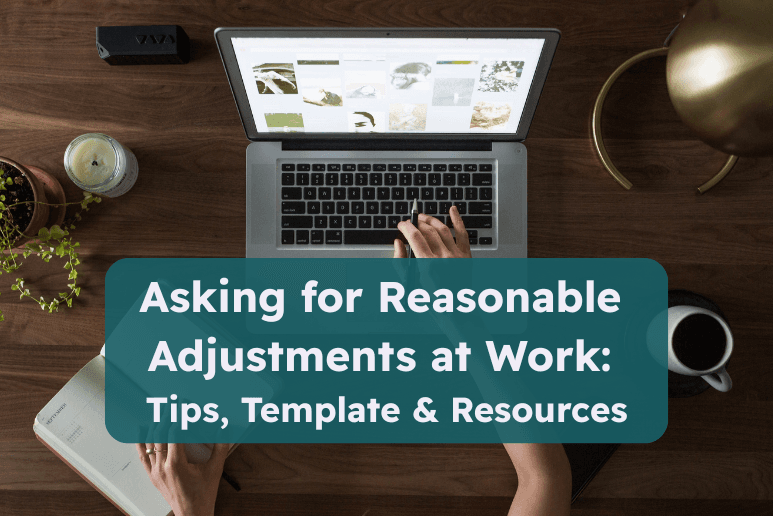All Articles
2 min read
Asking for Reasonable Adjustments at Work: Tips, Template & Resources
Written by
Purpl
Published on
August 18, 2025

Not sure how to ask your workplace for reasonable adjustments? You’re not alone. For many disabled and neurodivergent people, the thought of raising the subject can feel daunting. But here’s the important bit: you have a legal right to reasonable adjustments under the Equality Act 2010, and they exist to make sure you’re not at a disadvantage at work because of disability.
What Does “Reasonable” Mean?
The word reasonable can be confusing. In practice, it means changes that:
- Remove or reduce barriers so you can do your job
- Are practical for the employer to put in place
- Don’t cause disproportionate cost or disruption
Examples can include things like:
- Flexible working hours or extra breaks
- Noise-cancelling headphones, screen readers, or assistive software
- A quieter workspace or the option to work from home
- Adjusted deadlines or task prioritisation
- Providing information in an accessible format
What counts as reasonable will depend on the size of the organisation, the resources available, and the specific adjustment you need. But “reasonable” doesn’t mean “optional” — it’s about fairness and access.
How to ask for Reasonable Adjustments
Here are some practical steps to make the process easier:
1. Be clear about what you need.
Think about the barriers you face and the specific adjustment that would help. Frame it around how it will support you to do your job.
2. Put it in writing.
An email to your manager or HR is a good starting point. It creates a record and makes it easier for them to take action.
3. Keep the focus on the adjustment, not your medical history.
You don’t have to share every detail of your diagnosis — just explain the impact and what change would help.
4. Know your rights.
Employers have a legal duty to make reasonable adjustments if you’re disabled under the Equality Act. If you face resistance, remember: you don’t have to navigate it alone.
Handy Email Template
Here’s a simple structure you can adapt:
Subject line: Request for reasonable adjustments
Dear [Manager/HR],
I’m writing to request reasonable adjustments under the Equality Act 2010. I have a disability/neurodivergent condition which means that [briefly explain the barrier you face].
The following adjustment would help me carry out my role effectively:
- [List the adjustment(s) you’re requesting]
I believe this is a reasonable change that will support me in doing my job and contributing fully to the team. Please let me know if you’d like to discuss this further.
Thank you for your support.
Best regards,
[Your name]
Where to Get Support
- ACAS – Disability discrimination and reasonable adjustments
- Scope – Reasonable adjustments at work
- Citizens Advice – Reasonable adjustments for disabled workers
Final Thoughts
Reasonable adjustments aren’t “special treatment” — they’re about levelling the playing field so you can thrive at work. Asking for them isn’t asking for a favour, it’s asking for fairness.
Follow @Purpldiscounts on social media for the latest disability discounts, financial advice, and accessibility resources.
Other articles you might like:
What the UK Spending Review Means for Disabled People in the UK
Positive Talk About Disability in the Workplace
WeDeserveBetter: A Movement for Accessibility and Inclusion
Is it Considered a Disability in the UK?
How to Challenge a PIP Decision in the UK: What to Do If Your Claim Is Refused or Underpaid
